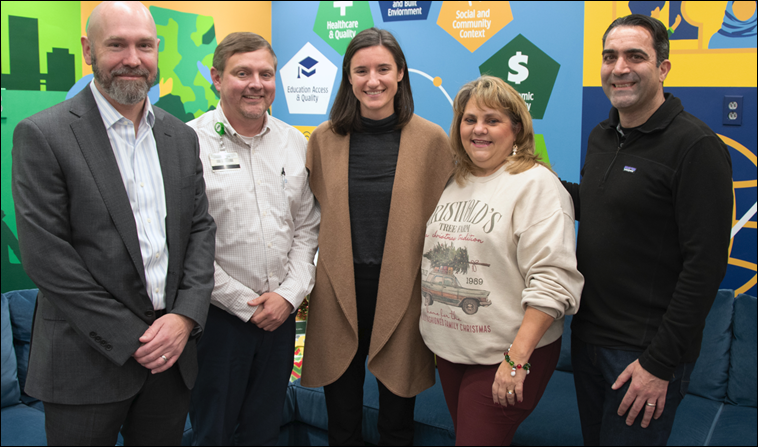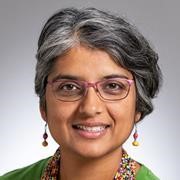
2025 Q4 DOM STAR Award for Staff Excellence!
Congratulations to COERE Deputy Director Madeline Gibson, MPH (center), the recipient of the 2025 Q4 DOM STAR Award for Staff Excellence!
DOM Award Winners!

Congratulations to COERE member Aadia Rana, MD, Professor of Medicine and Director of the Implementation and Community Sciences Core at the UAB Center for AIDS Research on receiving the Division Research Excellence Award!
Congratulations to COERE Member, Rena Patel, MD, Associate Professor in the Department of Medicine for receiving the Dream Mid-Career Award for Excellence in Research!

Matt Gravett, has been appointed as the new Clinical Core Director for the UAB Center for AIDS Research (CFAR).
Congratulations to Matt Gravett, MD, MSPH, COERE member and Assistant Professor in the Division of Infectious Diseases, on being named the new CFAR Clinical Core Director! Dr. Gravett brings exceptional research and clinical expertise, proven leadership experience, and a deep commitment to advancing HIV clinical research into the next era. In this role, he will oversee the CFAR Clinical Core, including data services, the specimen repository, and the PrEP registry fostering collaboration and driving innovative research that supports our mission to end the HIV epidemic.

Demario S. Overstreet receives prestigious NIH MIRA R35 award, grant totaling over $2 million in research funding from NIGMS!
Congratulations to Demario Overstreet, Ph.D., COERE member and Assistant Professor in the Division of Gastrointestinal Surgery, has received substantial funding from the National Institutes of Health to advance his innovative research program: “Contemporary Human Models of Postoperative Pain: A Biopsychosocial Investigation in General Surgery.” Read More Here

Audrey Lloyd receives K12!
Congratulations to Audrey Lloyd, MD, COERE Member and Assistant Professor in the Division of Infectious Diseases on being selected for the CCTS Deep South Mentored Career Development Program (K12)!

Announcing a new Learning Community honoring Elopre's legacy
The Heersink School of Medicine has launched the Elopre Learning Community, the first new addition to its learning community program since its inception, welcoming its inaugural cohort of MS1 students. Named in memory of Latesha Elopre, M.D., MSPH, a beloved COERE and faculty member who passed away earlier this year, the community honors her enduring legacy. Click here to read more!

Stephen Clarkson receives K23!
Congratulations to Stephen Clarkson, MD, COERE Member and Assistant Professor in the Division of Cardiovascular Disease on receiving notice of award for his K23 grant from NHLBI!

William Bradford new Assistant Professor in ID!
Congratulations to William Bradford, MD, COERE T32 Postdoctoral Alum on his new faculty appointment as Assistant Professor in the Division of Infectious Diseases! Will is committed to improving care for underserved populations with addiction and serious infections, as well as advancing understanding of how drug adulterants impact infection risk.

Dr. Oates takes the lead as new CSCH Director
COERE Member Gabriela Oates, Ph.D., has been named the new director for the Center for the Study of Community Health which aims to reduce health risk among communities throughout Alabama and offers prevention research opportunities to scholars from UAB and local communities. Click here for more information

Congratulations to the 2025 Durant Research Awardees
The Durant Research Awards aim to provide flexible support for historically disadvantaged faculty and staff in medicine who are considering or pursuing a research career. These awards reflect a commitment to equity, opportunity, and the advancement of underrepresented voices in academic medicine.
Please join us in congratulating COERE member and Associate Scientist, Amber Kinsey, PhD as one of the 2025 awardees for their dedication to research and their impact on the future of medicine.

The Mid-Career Award for Excellence in Research
The Mid-Career Award for Excellence in Research celebrates outstanding research achievements by DOM faculty at the mid-career level (Associate Professor). The DREAM Council is proud to recognize COERE member Rena Patel, M.D., M.P.H., MPhil. with this award for 2025.

Patel named associate director for Global Health Research for Mary Heersink Institute for Global Health
COERE Member and Scientist Rena C. Patel, M.D., MPH, MPhil, has been named associate director for Global Health Research for the UAB Mary Heersink Institute for Global Health (MHIGH), effective May 1. In this role, Patel, who also serves as an associate professor in the UAB Division of Infectious Diseases, will leverage her considerable experience with leading large-scale research programs and collaborations to advance the priorities of the UAB Heersink School of Medicine and MHIGH.
